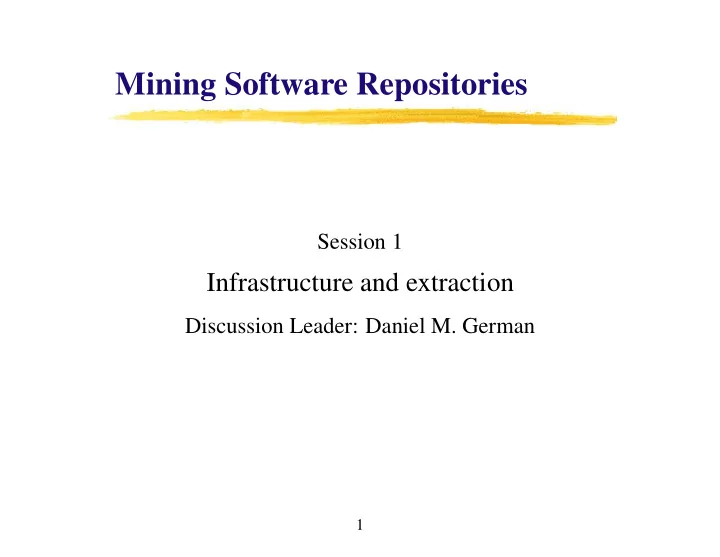

Mining Software Repositories Session 1 Infrastructure and extraction Discussion Leader: Daniel M. German 1
The Stages 1. Data Extraction 2. Data Mining/Facts Finding/Change Patterns/System Understanding 3. Integration and Presentation 2
The Extraction Stage • The dirty work, but somebody has to do it • Lots of raw data out there – Usually Open Source – Difficult to gain access to Closed source data 3
The Issues • Why do we need extract historical data? • Without a purpose, this data might have no value 4
The Issues... • What to extract? ( software trails ) – Code ∗ Releases ∗ Versioning history – Defects – Documentation ∗ Explicit (man pages, help system, design documents) ∗ Implicit (email messages) ∗ Web site 5
The Issues... • From Where – What projects to select? – The software process might have an impact in the way the historical data gets recorded – It is necessary to understand this process – Different projects store data in different ways 6
The Papers • The Perils and Pitfalls of Mining SourceForge by James Howison and Kevin Crowston • Their experiences mining sourceForge • What they learnt spidering the site • Some potential mistakes in the analysis of the extracted data 7
The Papers... • Text is Software Too by Alexander Dekhtyar, Jane Huffman Hayes and Tim Menzies • Mining of textual requirements documents • “Text mining from software engineering text is a hight risk, high return adventure.” 8
The Papers... • Mining CVS Repositories, the softChange experience by Daniel German • The revision history of the source code says a lot about the project: – it highlights the process, the architecture evolution, hidden relationships between files... • The Concurrent Versions System (CVS) is a major source of historical data 9
The Papers • Research Infrastructure for Empirical Science of F/OSS by Les Gasser, Gabriel Ripoche and Robert Sandusky • Preprocessing CVS Data for Fine-Grained Analysis by Thomas Zimmerman and Peter Weissgerber 10
Discussion: the Issues, revisited • Several people are working in the same problems – Comparison? – Collaboration? (Avoid reinventing the wheel) • Nomenclature? • Choosing projects for analysis? • Sharing data? • Sharing the extractors? 11
Recommend
More recommend